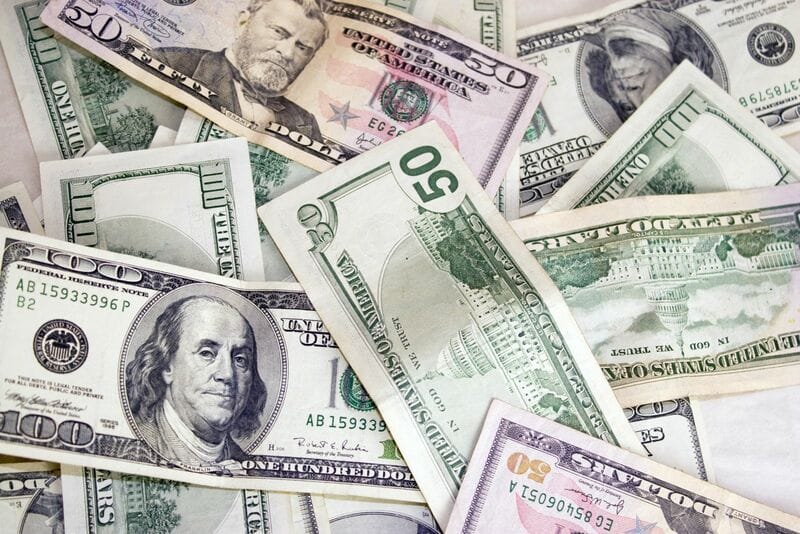
The dollar index (DXY00) Friday fell by -0.14%. The dollar Friday fell back from a 2-1/2 week high posted on overnight trade and retreated after weaker-than-expected U.S. inflation news knocked T-note yields lower. Also, strength in the yen weighed on the dollar after the yen climbed to a 1-1/2 week high after the BOJ tweaked its yield curve control program.
Friday’s U.S. economic news was mostly bearish for the dollar. Jun personal income rose +0.3% m/m, weaker than expectations of +0.5% m/m. Also, the Jun PCE core deflator, the Fed's preferred gauge of inflation, eased to +4.1% y/y from +4.6% y/y in May, better than expectations of +4.2% y/y and the slowest pace of increase in 1-3/4 years. In addition, the Q2 employment cost index rose +1.0% (q/q annualized), slower than expectations of +1.1% and the smallest pace of increase in 2 years. Finally, the University of Michigan U.S. Jul consumer sentiment was revised lower to 71.6 from the initially reported 72.6. On the positive side, Jun personal spending rose +0.5% m/m, stronger than expectations of +0.4% m/m.
EUR/USD (^EURUSD) Friday rose by +0.46%. The euro Friday recovered from a 3-week low and moved moderately higher on hawkish comments from ECB Governing Council member and Bundesbank President Nagel, who said, "Core inflation is stubborn, so our monetary policy needs to be even more stubborn.” The euro Friday initially fell to a 3-week low after German Jul CPI rose less than expected and after Eurozone Jul economic confidence fell more than expected to a 9-month low.
ECB Governing Council member and Bundesbank President Nagel said, "Core inflation is stubborn, so our monetary policy needs to be even more stubborn, and we need interest rates to be high enough and to keep them there for as long as necessary."
Eurozone Jul economic confidence fell -0.8 to a 9-month low of 94.5, weaker than expectations of 95.0.
German Q2 GDP was unchanged q/q, weaker than expectations of +0.1% q/q.
German Jul CPI (EU harmonized) eased to +6.5% y/y from +6.8% y/y in Jun, better than expectations of +6.6% y/y.
France Q2 GDP rose +0.5% q/q, stronger than expectations of +0.1% q/q.
USD/JPY (^USDJPY) on Friday rose by +1.07%. The yen Friday fell back from a 1-1/2 week high against the dollar and fell sharply. The yen retreated on dovish comments from BOJ Governor Ueda, who said Friday’s move by the BOJ to adjust its yield curve control was not a step toward normalization of BOJ policy and that there is a “long way” before the BOJ raises negative interest rates. The yen Friday initially rallied to a 1-1/2 week high after the BOJ tweaked its yield curve control program and effectively raised the upper limit of its 10-year JGB yield target to 1.0% from 0.5%. Also, stronger-than-expected Japanese inflation news was hawkish for BOJ policy and supportive for the yen after Tokyo Jul CPI rose more than expected.
The BOJ, as expected, kept its policy balance rate unchanged at -0.1%. The BOJ also kept its target for 10-year yields at around 0% but said the 0.5% ceiling was now a reference point and that it would offer to buy 10-year debt at 1.0% each day, suggesting an effective doubling of the upper target of the yield range.
Tokyo Jul CPI rose +3.2% y/y, unchanged from Jun and stronger than expectations of +2.9% y/y. Tokyo CPI ex-fresh food and energy rose +4.0% y/y, stronger than expectations of +3.7% y/y and the most in 40 years.
August gold (GCQ3) Friday closed up +14.7 (+0.76%), and Sep silver (SIU23) closed up +0.128 (+0.53%). Precious metals prices Friday settled moderately higher. Weakness in the dollar Friday was bullish for metals prices. Also, Friday’s U.S. inflation news on the Q2 employment index and Jun core PCE deflator was weaker than expected, knocking bond yields lower and supporting precious metals. On the negative side was Friday’s action by the BOJ to tweak its yield curve control program, which sent the 10-year JGB bond yield soaring to a 9-year high. Also, fund liquidation of long gold holdings is weighing on gold prices after long gold holdings in ETFs fell to a new 3-year low Thursday.
On the date of publication, Rich Asplund did not have (either directly or indirectly) positions in any of the securities mentioned in this article. All information and data in this article is solely for informational purposes. For more information please view the Barchart Disclosure Policy here.






